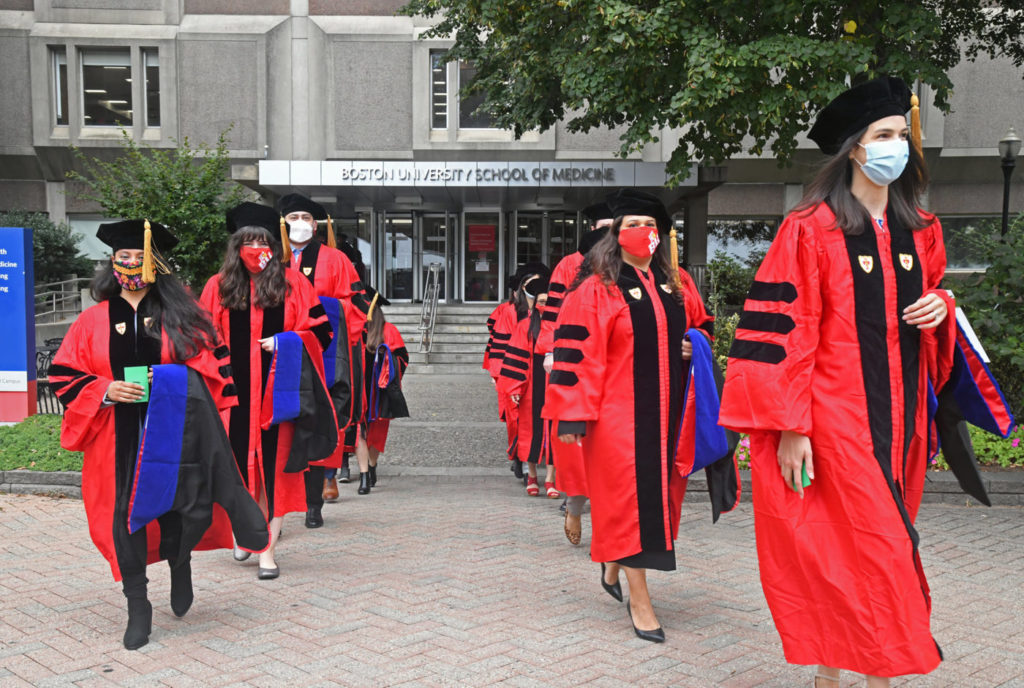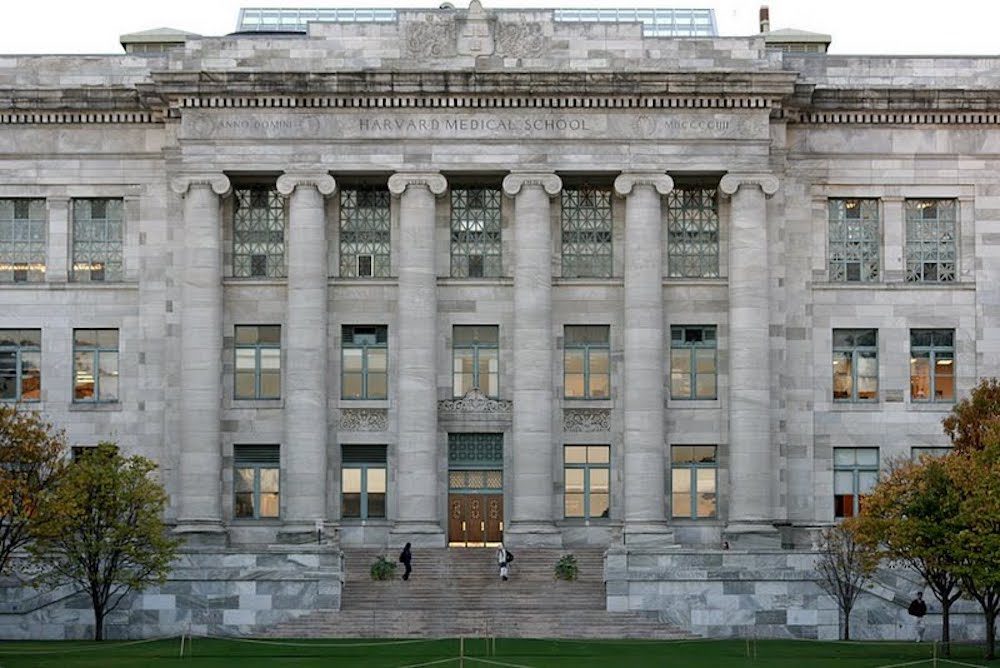The Boston University School of Medicine has a fierce dedication to serving the underserved and maintaining a global perspective in its teachings. Undergrads have the opportunity to engage with Boston University’s cutting-edge medical research and learn patient care in diverse environments across the Boston area. With its emphasis on empathy and altruism, as well as its state-of-the-art facilities, it’s no wonder BU School of Medicine attracts prospective students from around the world.
This article organizes key information about BUSM into an ultimate guide for applicants. Since universities tend to have sitemaps as complicated as the New York City transit system, we’ve also included plenty of links to help you access key information quickly. If you’re excited to apply to BU School of Medicine, then you’re in the right place. Consider bookmarking this page so you can easily return to it at any time during the application cycle.
Be an Informed Applicant
If you’re working to attend the Boston University School of Medicine, it’s important to familiarize yourself with the school’s values, legacy, and offerings. Even if you already have your heart set on BUSM, having a deep knowledge of the school helps you communicate why it’s the right place for you. By preceding your formal application process with some preparatory research, you’ll have a competitive edge when it’s time for the written and interview portions of the application process.
This article will go into:
- Core BUSM Accomplishments and Values Applicants Should Know
- Medical Programs Offered at BUSM
- BUSM’s Selection Factors (Required GPA and Other Pre-Requisites)
- Acceptance Rate, School Rankings, and Other Helpful Statistics
- Cost of Attendance
- AMCAS Primary Application and Busm Secondary Application
- BUSM Secondary Application Essay Questions, Example Answers, and Advice
- BUSM Interview Questions and How to Prepare for Your Interview
- Admissions Consulting and Healthcare Internships
The information complied here is meant to provide a thorough and helpful overview of BUSM and its application process. Still, applying to medical school can get overwhelming fast. If you want hands-on help navigating the admissions process, optimizing your application, or you just want expert feedback on something, consider our medical school admissions consulting.
Legacy and Core Values
First, let’s talk generally about what BU School of Medicine has achieved, and what it wants its students to be excited about. We’ll also discuss BUSM’s “Frontline Medicine” philosophy and practice.
Famous Breakthroughs at Boston University School of Medicine
Head Trauma/CTE – Researchers at BU School of Medicine pioneered the study of Chronic Traumatic Encephalopathy (CTE). Their efforts have led to policy changes in major athletic organizations, as well as a greater general awareness of the brain disease and its link to repetitive head trauma.
2008 Nobel Prize in chemistry – Green Fluorescent Protein (GFP) has become an indispensable tool in the fight against cancer. GFP is used to observe how cancer cells spread, and it was discovered at Boston University by BUSM Professor Emeritus Osamu Shimomura, PhD.
Framingham Heart Study – Launched in 1948 by Boston University in collaboration with the National Heart, Lung, and Blood Institute, the Framingham Heart Study is the basis for much of our modern knowledge about the causes of heart disease. This world renown study is in its third generation of participants and has grown into a network of studies conducted across the globe.
Frontline Medicine
For BUSM, Frontline Medicine means emphasizing medical practice that affects change in the world and strengthens the health of underserved communities. The following initiatives are BUSM’s key, hands-on programs that practice this philosophy.
Homeless Outreach – The BUSM Outreach Van Project takes students and faculty throughout Boston to provide clothes, food, medical aid, and more to the city’s homeless population. BUSM also provides care on campus in collaboration with the Boston Health Care for the Homeless program.
Global Health Program – Participants in BU’s Global Health Program have cared for communities across the globe. BUSM emphasizes knowledge and appreciation of diverse cultures in order to ensure a generation of knowledgeable and empathetic physicians. (For pre-medicine students interested in similar programs, here at International Medical Aid we offer voluntary healthcare internships abroad.)
Home Care – In BUSM’s Home Care Program, faculty and students collectively serve nearly 600 homebound patients across greater Boston. The program has been a part of Boston University since the 1870s and is available to fourth-year medical students.
You can learn more about the Boston University School of Medicine’s Frontline Medicine programs and philosophy here.
Medical Programs at Boston University School of Medicine
BUSM offers a wide variety of academic programs in the medical field. Here are the main ones:
- Doctor of Medicine (MD)
- Doctor of Medicine/Doctor of Philosophy (MD/PhD program in collaboration with the Division of Graduate Medical Sciences)
- MD & Oral Maxillofacial Surgery (in collaboration with the Henry M. Goldman School of Dental Medicine)
- Dual Degree Programs
- Fellowship Programs
MD Program
The curriculum at the Boston University School of Medicine is informed by the emerging needs and trends in patient care and medical research. BUSM prides itself on its contemporary and evolving curriculum, as they continuously expand and improve available electives each year. Here’s a breakdown of BUSM’s current curriculum.
1st Year:
- Principles Integrating Science & Medicine (PriSM)
- Patient to Population Health (Human Behavior in Medicine & Essentials of Public Health)
- Doctoring 1
First year students undergo foundational studies of scientific and medical principles. This phase covers a broad spectrum of sciences, such as physiology, biochemistry, neuroscience, and immunology. In additional to traditional medical teachings, students are taught about Boston and its people, from neighborhood wealth disparities to USCM’s patient demographics. From the get-go, students will learn how best to serve and understand their community — a core tenant of USCM’s institutional identity. The first year also includes supervised patient interviews and physical exams.
2nd Year:
- Disease and Therapy (DRx)
- Doctoring 2
The foundation of the second year at BUSM is a year-long course, Disease and Therapy. Pathophysiology and disease management are studied through workshops and case studies alongside clinical faculty. Students dig deeper into the subject of disease and therapy through discussions with patients.
3rd Year – Clerkships:
- Pediatrics (6 weeks)
- OB/GYN (6 weeks)
- Family Medicine (6 weeks)
- Psychiatry (6 weeks)
- Neurology (4 weeks)
- Surgery (8 weeks)
- Medicine (8 weeks)
- Selective: Radiology, Emergency Medicine, or Research (4 weeks)
The third year is comprised of 8 clerkships. The curriculum immerses students in all of the core disciplines of modern medicine. Professional development is guided by a continual rise in responsibility as experience and abilities develop. The clerkships focus on medical knowledge, clinical procedures, and getting to know the challenges of each field. This year’s goal is to rapidly develop students’ doctoring skills and competency of practices across all disciplines.
4th Year – Rotations:
- Selective: Ambulatory Medicine or Surgery (4 weeks)
- Geriatrics (4 weeks)
- Sub-Interships (4 weeks)
- Electives (24 weeks)
Fourth year students undergo sub-interships in preparation for postgraduate training. Sub-interns perform the function of an intern with less patients and more support and supervision from the attending physician. The bulk of the fourth year is spent with elective course work and working with faculty to prepare for internship and residency.
MD/PhD Training Program
The School of Medicine and the Division of Graduate Medical Sciences offer the MD/PhD program to highly motivated and qualified students interested in becoming top-tier physician-scientists. BU has 14 departments participating in this program and touts a collaborative spirit, as well as well-funded research opportunities.
Dual Degree Programs
The following Dual Degree Programs are offered by BU School of Medicine:
- MD/MBA: Medicine & Business – The Medicine & Business Program takes 5 years to complete and includes the four-year MD curriculum plus 46 MBA credits.
- MD/MSCR: Medicine & Clinical Research – Pertinent to students hoping to research medicine in an academic, pharmaceutical, or biotechnology setting, the Medicine & Clinical Research Program takes 5 years to complete and includes the required four-year MD coursework, as well as 18 credits in clinical research.
- MD/JD: Medicine & Law – BUSM’s Medicine & Law Program takes 6 years to complete and includes the first 3 years of MD coursework, followed by 2 years at BU’s School of Law. The final year includes coursework from both schools.
- MD/MPH: Medicine & Public Health – The Medicine & Public Health program takes 5 years to complete and requires 40 credit hours at BU’s School of Public Health and at least 8 credit hours at BUSM.
Residency Programs
BU School of Medicine offers the following residency programs, practiced in a variety of clinical settings throughout the Boston area:
- Anesthesiology
- Dermatology
- Emergency Medicine
- Family Medicine
- Medicine
- Neurology
- Obstetrics & Gynecology
- Ophthalmology
- Pathology & Laboratory Medicine
- Pediatrics
- Psychiatry
- Radiation Oncology
- Radiology
- Surgery
- Neurosurgery
- Orthopaedic Surgery
- Otolaryngology—Head & Neck Surgery
- Urology
Fellowship Programs
BU School of Medicine offers the following fellowship programs:
- Addiction Medicine
- Advanced Inflammatory Bowel Disease
- Allergy/Immunology
- Cardiovascular Medicine
- Endocrine
- Gastroenterology
- Geriatric Medicine
- Hematology/Oncology
- Infectious Disease
- Internal Medicine/Primary Care
- Nephrology
- Obesity Medicine
- Pulmonary Disease and Critical Care
- Rheumatology
BUSM’s Teaching Sites
The School of Medicine’s main teaching hospital is Boston Medical Center. Boston Medical Center is a unique hospital to learn in:
- It’s the busiest emergency department in the region
- It is the largest trauma center in New England
- It is the largest and busiest safety net hospital in the northeast
- BMC operates the only hospital-based food pantry in the United States.
- BMC includes a center for refugee health and human rights
- 30% of patients speak non-English primary languages
Students also engage in BUSM’s unique network teaching sites throughout their clinical years. Diverse settings such as VA hospitals and community health centers prepare students for real-world practice in the country’s complex healthcare system.
Extracurricular Enrichment Activities
Boston University School of Medicine offers a variety of Extracurricular Enrichment Activities for students in good academic standing. These programs offer students the ability to further their learning of specific disciplines under the tutelage of BUSM’s top faculty members.
- Eat to Treat: A Nutrition Course for Future Clinicians – This program is for first-year medical students interested in deepening their knowledge of how food and nutrition relate to chronic conditions.
- The Healer’s Art – This spring program is open to first and second year medical students and explores a broad range human elements in practicing medicine. Topics include healing loss, how to prevent burnout, and sustaining idealism and altruism.
- Medical Mandarin Club – This program is for first and second year medical students to learn Mandarin and develop a cultural understanding of Mandarin-speaking communities.
- Medical Technology and Innovation – This program explores medical innovation and advancements and prepares students to competently contribute to emerging healthcare technology.
- Surgery Enrichment Activity – This program provides exposure to the field of surgery and has two different sessions for first year and second year medical students.
Research Projects
BUSM’s Enrichment Office offers a number of research opportunities for students interested in conducting healthcare-related work with faculty. Current student-faculty research includes projects across a variety of fields, such as:
- Medicine
- Neurology
- Ophthalmology
- Otolaryngology
- Pediatrics
- Psychiatry
- Radiology
BUSM’s Selection Factors, GPA, and Other Prerequisites
Selection Factors
In addition to academic achievements, BUSM’s Admissions Committee conducts a holistic review of applicants’ life stories, volunteer experience, cultural competency, recommendations, and more. BUSM highly values diversity and an applicants ability to relate to patients of all cultures and backgrounds. Additionally, BUSM looks for students who will thrive in their hands-on, service driven curriculum. Take a look at the Selection Factors of BUSM’s Admissions Committee.
Required GPA
The Boston University School of Medicine does not have a specific GPA requirement. The average GPA of students accepted in 2021 was 3.72.
Other Prerequisites for Boston University Pre Med Students
- Applicants who have enrolled at other medical schools are not eligible
- Applicants must complete college-level coursework in English Composition/Literature, Humanities, Biological Sciences (including lab work), Chemistry (including lab work), and Physics
- Applicants must take the CASPer test
Class Statistics, School Rankings, and Other Statistics
Here are some helpful statistics to help you better understand the school.
Boston University School of Medicine Acceptance Rate and Enrollment
For 2020-2021, Boston University School of Medicine received 9,112 applications and accepted 524 students. Of those accepted, 174 enrolled.
- The acceptance rate at BUSM is 5.75% and the enrollment rate is 33.21%.
- In 2021, the total enrollment BUSM’s MD program was 764.
- BUSM’s interview rates are 20.5% for in-state applicants and 11.9% for out-of-state applicants.
Class Profile
Here is the profile BUSM has provided for their 2021 entering class:
- 97 Four-Year MD
- 6 MD-PhD
- 7 Early Medical School Selection Program (EMSSP)
- 31 Seven-Year BA-MD Program
- 10 Modular Medical Integrated Curriculum (MMEDIC)
- Average GPA 3.72
- Average MCAT 517/96%
- 16% Underrepresented in Medicine
- 59% Women
- 32 States
- 31+ Hold Masters degrees
- Range in age 21-37
- 84 Undergraduate universities
- 82% Bilingual
- 16 Birth Countries
- 7 Resident Countries
Boston University Medical School Ranking
The 2022 U.S. News & World Report ranks Boston University School of Medicine #33 in research. The report ranks BUSM #44 in primary care.
BUSM also ranks:
- #68 in Most Diverse Medical Schools
- #131 in Most Graduates Practicing in Medically Underserved Areas
- #98 in Most Graduates Practicing in Primary Care Fields
- #140 in Most Graduates Practicing in Rural Areas
Additionally, U.S. News and & World scores Boston University 72 out of 100 and gives it the following rankings:
- #42 in National Universities
- #38 in Best Value Schools
- #70 in Most Innovative Schools
- #32 in Undergraduate Research/Creative Projects
Other Helpful Statistics about Boston University and BUSM
- Boston University has 175 acres of campus
- College Factual ranks BU in the top 5% for overall diversity
- BU’s total undergraduate enrollment is 16,530
- BU’s student body totals at 33,678
- Boston University is home to 70+ cultural and religious organizations, 80+ community service and justice organizations, 60+ art and performance organizations, and 140+ academic and professional organizations.
Cost of Attendance
Here, we list BUSM’s yearly tuition, as well as the estimated cost of attendance. Cost of attendance includes tuition and other expenses, such as housing, healthcare, transportation, textbooks, supplies, food, and fees. Remember, tuition is included in cost of attendance.
Year 1:
- $66,702 Tuition
- $91,870 Cost of Attendance
Year 2:
- $66,702 Tuition
- $96,232 Cost of Attendance
Year 3:
- $66,702 Tuition
- $99,800 Cost of Attendance
Year 4:
- $66,702 Tuition
- $98,005 Cost of Attendance

AMCAS Primary Application and BUSM Secondary Application
Applying to medical school requires two applications: primary and secondary. For most schools, your primary application with be AMCAS. Once you complete your AMCAS application, it will be distributed to BUSM and any other schools you apply to.
After receiving your AMCAS, BU School of Medicine will send you a link to apply with their secondary application.
For a more in-depth explanation, take a look at our article on understanding the differences between primary and secondary medical school applications.
BUSM Secondary Application Essay Questions, Sample Answers, and Advice
Your essay responses on BUSM’s secondary application are important opportunities to explain your qualifications and ambitions in a compelling and informative way. These responses will be carefully reviewed by the BUSM Admissions Committee, so take your time and consider how to best present your strengths.
Here are the essay prompts from the Boston University Medical School secondary application for the 2020-2021 academic year. We’ve provided some sample answers, as well as advice on how to approach and structure your responses to each prompt.
For more in-depth tutelage on how best to optimize your medical school essay responses, consider IMA’s medical school admissions consulting.
Secondary Question #1
Are you expecting to go on to medical school directly after completing your undergraduate degree?
(Post bac work is NOT considered undergraduate. If attending a post bac program prior to entering medical school, the answer is NO and should be explained.) If you took gap year(s), please use this space to explain what you have been doing prior to applying to medical school. (1,400 characters)
If you’re going straight to medical school after completing your undergraduate degree, answer accordingly and explain why you’re confident choosing this path. A “yes” answer could include mentions of exceptional academic performance, research experience, high scores on the MCAT, or connections with mentors in medicine who have encouraged you to pursue medical school.
If are not planning to go directly to medical school after you graduate, or if you’ve already taken time off since graduation, explain how your experiences in the meantime have better prepared you for medical school. A “no” answer could describe taking time off to attend a voluntary healthcare internship abroad, pursing relevant post-baccalaureate education, or tending to important personal/family matters.
Here is a sample answer explaining why the applicant took a gap year.
During my final year of study, I put all of my efforts into the medical school application process. While I was eager to dive into medical school, I recognized that my application would greatly improve with a year of studying, interning, and volunteer work. My gap year helped improve my MCAT score and deepened my knowledge of healthcare and underserved communities.
My gap year was hardly a vacation, although I did take the opportunity to visit my family more regularly. During this time, I undertook an emergency care internship in Kenya with International Medical Aid. While in Kenya, I established a strict study schedule for myself and took every opportunity to dialogue with IMA’s physicians. The knowledge I gained from such an intense, transformative period has increased my ambition and confidence for practicing medicine and enriched my life immensely.
Before and after my internship in Kenya, I spent time in Chicago, IL, where my extended family lives. There, I continued my MCAT studies and volunteered at the Benton House Community Center. At Benton House, I helped run a food pantry that primarily serves Mandarin-speaking communities. I learned a lot about cultural differences in food preference and dietary needs, and improved my Mandarin fluency. Looking back, I am grateful for the chance to explore my Chinese heritage during this important time in my life.
Secondary Question #2
2. If you have spent more than 4 years as an undergraduate, please explain below. (You may skip this question if you have graduated within 4 years.) (1,400 characters)
If this question applies to you, and you have spent more than 4 years as an undergraduate, it’s best to be honest and transparent in your response. Depending on your situation, there are different ideal approaches to this question.
For instance, if you took more than 4 years to complete your undergraduate degree because you pursued a dual degree or other accomplishments beyond the normal scope of an undergraduate, then answering this question gives you an opportunity to share your unique academic credentials with the admissions team.
In most other cases, this question should be answered in terms of overcoming adversity. If you struggled with personal problems such as illness, financial hardship, or difficulty keeping up with your coursework for other reasons, then you should acknowledge those challenges and explain how you overcame them.
Here is a sample answer explaining why the applicant went part time during their final years of college.
During my final year of college, I struggled to balance the demands of rigorous coursework and a full-time job that provided my only source of income. Within the first few weeks of what would have been my final year of college, I made the difficult decision to commute part-time. This allowed time to fully engage with my academic workload, while also strengthening my financial situation to ensure that I could complete my degree in a timely fashion.
In the end, this decision paid off immensely. I was able to improve my academic performance in my major, complete all of the necessary coursework to receive my degree, and strengthen my professional resume with another year of work. By my final semester, I had taken on additional electives to round out my course load and explore my academic interests more deeply. I was able to volunteer at a local eldercare facility, which helped me gain valuable experience with general caregiving and end of life care.
Since going part-time, I’ve acquired a newfound excellence in organization and time management skills that helped me succeed in my final full-time semester. I believe the skills I learned from this experience will be tremendously helpful in medical school and beyond.
Secondary Question #3
Please provide a narrative or timeline to describe any features of your educational history that you think may be of particular interest to us.
For example, have you lived in another country or experienced a culture unlike your own, or worked in a field that contributed to your understanding of people unlike yourself? Or, have you experienced advanced training in any area, including the fields of art, music, or sports? This is an opportunity to describe learning experiences that may not be covered in other areas of this application or your AMCAS application. It is not necessary to write anything in this section. Also use this section to explain any impact that COVID-19 may have had on your educational/research/volunteering or employment plans. (2,000 characters)
This question has a lot of parts, with a lot of options for how to focus your answer. Let’s break it down. This question asks for:
- Examples of cultural competency
- Details about non-medical advanced training
- Unique learning experiences
- How COVID-19 has impacted your professional/academic life
Remember, with questions like these, you are not required to cover everything. In fact, with a 2,000 character limit (around 350-400 words), it’s best to focus on the things you believe exemplify your strengths, personality, and unique attributes.
For instance, if you have advanced training as a violinist, you can highlight this without taking away from more relevant experiences you wish to share with admissions.
Also, keep in mind that all medical schools emphasize the importance of diversity in the medical community, yet BUSM is particularly focused on enrolling students with diverse backgrounds, cultural competency, and a fierce drive to serve underserved communities. Make sure to include any experiences that will be appealing to this mission.
Here is a sample answer that focuses on the applicant’s cultural competency and empathy for underserved communities.
I have always had a strong desire to travel and experience other cultures. During my undergraduate degree, I studied for a year in Tokyo. It was an incredible experience to live abroad and learn about the history of one of the world’s most fascinating cities. I didn’t know it at the time, but the most important thing I learned in Tokyo was what it feels like to be a minority in a foreign country who can’t speak the local language.
While attending college, I spent my summer breaks volunteering at an NGO that provides free medical care to the community. Volunteers met weekly to discuss how to make the program welcoming to non-English speakers and immigrants who had negative experiences with the American healthcare system. These meetings opened my eyes to the difficulties that exist in under-served communities, and made me more determined to provide medical care that is empathetic and compassionate.
When I returned to this program after a year in Tokyo, I noticed I was relating to community members with greater ease, and found myself more interested than ever in their personalities and stories. While I had always been friendly with the people we served and participated in thoughtful discussions about diversity, something in me had changed. It was unsettling to realize, but before I experienced being in a foreign country, I was treating unfamiliar populations differently. I now understand that, although kindness is infinitely valuable in medicine, diversity and diverse experiences are absolutely necessary for doctors to relate to their patients. This is an epiphany I revisit often, to humble myself and remember that my cultural understanding is one of the most important tools I take with me into medicine.
Unfortunately, COVID-19 changed things. The pandemic caused my place of work to close, which meant I had to prioritize my financial stability over my volunteer work. However, this also provided me with a fresh focus on my remaining academic studies.
Secondary Question #4
Why BUSM?
Boston Medical Center is the largest safety net hospital in New England, serving primarily people who are publicly insured, people of color, immigrants, and low-income people in the Greater Boston Area. Why are you specifically interested in beginning your medical education in this environment, and how do you feel that your previous experiences will prepare you for this unique learning environment? (3,000 characters)
“Why this school?” This prompt appears in every application in one way or another. To answer this question effectively, you need to have a broad knowledge of the school’s identity and be familiar with the programs, opportunities, and amenities BUSM has to offer.
This prompt also asks, “what makes you the right fit for this learning environment?” Again, your research into the school will pay off here. In this case, you need to demonstrate an understanding of what makes BUSM unique and tailor your answer accordingly.
This article has covered how BUSM’s mission to serve is foundational to its institutional identity. Let’s go over some ideas for how to incorporate your personal experience and ambition into a moving and informative essay response. The goal is to highlight your unique qualities and concretely demonstrate why you’ll thrive at BUSM. You could mention:
- Your volunteer experience
- Your economic, cultural, or ethnic background
- Your professional ideals and principles (use an example)
- How and why learning in this environment is important to doctors in general
- What you’ve already learned from experiencing similar environments
Secondary Question #5
Use the space below to provide additional information you feel will provide us with a comprehensive understanding of your strengths as a candidate for a career in medicine. This should include only information NOT already included in your AMCAS or other sections of the BUSM Supplemental Application. Most applicants leave this blank (3,000 characters). Yes, it’s really optional.
“Anything else?” questions like this one are very open-ended, and they provoke a lot of anxiety for students fearful that one missing sentence will cost them the opportunity to realize their dream of attending BUSM. Even though this question is optional, however, it’s advised that you use this opportunity to further cement your candidacy.
If “most applicants leave this blank,” your response will be read with attention. Given this, it’s important to follow the instructions. Do not repeat things you’ve covered in other answers, and do not reword your personal statement from your AMCAS. Instead, think about:
- Is there anything relevant to your qualifications or personality that you didn’t have space to cover in your other essays?
- What is the rest of your application missing that prevents you from communicating your strengths as a candidate?
- Is there relevant information in something you already covered, but didn’t fully communicate?
When writing your essays, be direct and keep your language intentional. Use examples to demonstrate your strengths and keep your narratives organized. Overall, use each prompt as an opportunity to communicate why you are the perfect fit for enrollment.
Interview Questions and How To Prepare
Every interview will vary depending on the institution, the candidate, and the interviewer. However, there are certain questions you should prepare for.
Most BUSM applicants have reported the following details about the school’s interview process:
- Number of interviewers: 1
- Length of interview: Usually 45-60+ minutes
- Stress level of the interview: low
- Type of interview: one-on-one and open file
- Interviews can be conversational with few direct questions
Interview Questions
Here’s a list of interview questions previous BUSM applicants have reported:
“How did you show resilience?”
“What do you do for fun?”
“What do you think is the biggest problem in healthcare today?”
“What is your greatest failure?”
“Tell be about your three most meaningful experiences.”
“How did you come to medicine as a career choice?”
“Tell me about yourself.”
“What do you want to get out of your education at BUSM?”
“Name 5 words that describe you.”
“Tell me about volunteer experience.”
“Describe an ethical dilemma you were in and how you overcame it.”
How to Prepare for Your Interview
It’s normal to feel nervous about interviewing. Medical schools want students with great interpersonal skills, but that’s not the only thing being tested at an interview. You will also need to demonstrate your knowledge healthcare in general and the specific field you’ve chosen to pursue.
Remember that communicating your ambition to attend BUSM specifically is immensely important to the admissions committee. They want to know how you will make a difference at BUSM and in your future career, and this requires that you show an understanding of what makes BUSM unique and different from other medical schools. This is where your online research and preparation will come into play.
Below are some things to keep in mind during your interview, as well as some tips on how to prepare.
- Be yourself. BUSM is looking for who you really are.
- Come prepared with several questions for the interviewer.
- Show enthusiasm for the school. Explain specific BUSM programs and accomplishments that excite you.
- Answer questions thoroughly yet succinctly; most responses should be 2-4 minutes long.
- Be prepared to give examples of what you do in your free time.
- Be open-minded and go where the interviewer wants to take the conversation/be conversational when appropriate.
- Practice answering the above interview questions out loud throughout the day.
- Conduct mock-interviews
- Stay organized and give yourself plenty of time on campus before the interview
- Surround yourself with supportive, encouraging friends or family leading up to the interview
- Finally, consider medical school admissions consulting
Remember to take plenty of time to reflect on what makes you uniquely fit for medical school as an individual. Questions such as “tell me about yourself” and “describe your weaknesses” are opportunities to share compelling narratives that demonstrate who you are as a person.
Admissions Consulting and Healthcare Internships
It’s often joked that the only thing tougher than applying to medical school is going to medical school. During the application process, there are so many opportunities to best your best foot forward that you don’t want to miss. While you may be the perfect candidate, communicating your strengths is a challenge unto itself.
At International Medical Aid, our medical school admissions consulting has helped thousands of students for over 25 years attend top medical school across the country. We offer a complementary 30-minute session to help you determine the best way for us to help you. If you have your heart set on BUSM or any other school, admissions consulting is an invaluable tool at your disposal to help you enroll in your dream school.
We also provide world-class, immersive global healthcare internships. Our internships demonstrate your dedication to serving under-served communities abroad, as well as your understanding of the state of healthcare globally. We offer many programs to fit a variety of medical interests. You’ll not only have the learning experience of a lifetime, but you’ll have so much to discuss and showcase in your medical school applications.
We hope you’ve found this guide invaluable in your application journey. Remember to check out our other medical school guides:
- California University of Science and Medicine
- UC San Diego Medical School
- California Northstate University College of Medicine
- Touro University of California
- CHSU College of Osteopathic Medicine
- UC Davis School of Medicine
- Harvard Medical School
- UC Riverside School of Medicine
- USC Keck School of Medicine
- UT Southwestern Medical School
- Long School of Medicine at UT Health San Antonio
- University of the Incarnate Word School of Osteopathic Medicine
- UT Austin’s Dell Medical School
- UTMB School of Medicine
- McGovern Medical School at UT Health
- Johns Hopkins School of Medicine
- McGovern Medical School at UT Health
- The University of Texas Rio Grande Valley School of Medicine
- UNT Texas College of Osteopathic Medicine
- University of Houston College of Medicine
- Texas A&M College of Medicine
- Johns Hopkins Medical School
- Baylor College of Medicine
- George Washington University School of Medicine
- Vanderbilt University School of Medicine
- St. George’s University School of Medicine
- Lake Erie College of Osteopathic Medicine (in Pennsylvania)
- Sidney Kimmel Medical College at Thomas Jefferson University
- Wake Forest University School of Medicine
- Western University of Health Sciences (in California)
- Drexel University College of Medicine
- Stritch School of Medicine at Loyola University Chicago
- Georgetown University School of Medicine
- Yale School of Medicine
- Perelman School of Medicine
- UCLA Medical School
- NYU Medical School
- Washington University School of Medicine
- Brown Medical School
We wish you the best of luck in your academic and professional career. We are here if you need any help along the way!






